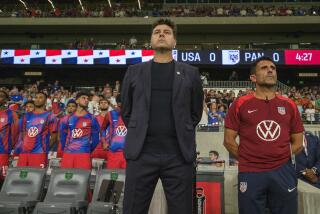Column: U.S. men’s national team looks to flip the script on perception of American soccer

- Share via
Reporting from Orlando, Fla. — Christian Pulisic had spent less than two days in training camp with Gregg Berhalter, new coach of the national team, when he was asked to play a game of word association. What should come to mind in the rest of the world when they think of U.S. Soccer?
“A real world force. A team that has a chance against anyone,” he said this past week. “I don’t want them to just see it as, ‘Oh, it’s just the U.S.’ I want them to fear [us] like a big team.
“That’s our goal. We want to be respected around the world.”
At this point it might be helpful to remember that Pulisic, despite his 24 caps and nine international goals, is still just 20. And children often say the darnedest things.
But the midfielder isn’t alone in setting the bar high for a national team that failed to qualify for the last World Cup. U.S. Soccer has a well-earned reputation for fielding hard-working teams of limited skill, for developing players who never give up but never seem to have a clear identity of what they stand for either.
The current national team wants to flip that script.
“One of the goals that we have is to change the way people look at American soccer,” agreed midfielder Weston McKennie, who is also 20. “Yes, we want to also be known [for] the typical American style. The ones that work all the time, never give up, give 100%.
Sign up for our weekly soccer newsletter »
“But we also want to be known as a team that can play and compete at the highest level.”
If the players are readily downing that Kool-Aid, credit Berhalter for mixing the elixir. Hired in December to change both the performance and personality of the national team, he’s already succeeded in getting the players to buy into his vision of a dynamic, attacking philosophy that’s as difficult to learn as it is to defend.
Defender Tim Ream — who, at 31, is not a member of Berhalter’s Kiddie Korps — said the challenge is a welcome one.
“It’s a breath of fresh air because before, it was, ‘Let’s qualify by any means necessary.’ Chopping and changing, switching things up, whatever it took,” said Ream, who made his international debut in 2010 and is one of only two men to play for the last four U.S. coaches. “He’s focused on playing a certain way and sticking to it.”
The early results have been encouraging, with the U.S. winning its first three games under Berhalter without conceding a goal. The team will get its stiffest test of the Berhalter era Tuesday night in Houston when it meets Chile, ranked 13th in the world by FIFA. None of the Americans’ first three opponents — Panama, Costa Rica and Ecuador — are in the top 35.
Winning is only part of the goal at this point. The larger aim is installing Berhalter’s style and establishing the team identity that goes with that. The coach says both those things will take time.
“I don’t think it’s appropriate to really define that right now because we’re in the process of forming that,” he said of the team’s character. “We know we want to be a team that competes. We want to be a team that’s brave, that is attacking-oriented.”

Defender Matt Miazga, halfway through his first camp with Berhalter, agrees with those aims — and with McKennie’s desire that the team build a personality that is part old-school grit and desire as well as part new-generation ambition.
“As Americans in the national team program, we kind of relate to our fighting spirit and the pride we take on the pitch; always fighting to the last minute, which will always be there,” Miazga said. “But something that we did lack in the past is a clear footballing identity, a philosophy that we can go about and pursue and try to play in a certain way.
“Hopefully very soon media, fans, supporters and the general public, when they see the U.S. team, they know what to expect. They know what we’re about. And they know that we’re a very difficult team to play against.”
Berhalter got his first look at the full toolbox he’ll have to build that team this past week when the FIFA international break allowed him to call up European-based players such as Pulisic, McKennie, Ream and Tyler Adams for the first time. For the most part, he was happy with what he saw — Ream assisting on Gyasi Zardes’ game-winning goal against Ecuador, while Adams, playing in an unaccustomed position at right back, had 116 touches, the most by a U.S. player in more than three years.
“We’re continually defining exactly who we want to be as a group as we get more players in,” the coach said. “This phase still is the evaluation phase of who we are as a group. This takes time.”
But Berhalter has succeeded in convincing his players that he has a direction for the future and a road map to get them there. Now all he has to do is make sure they keep following him.
“We want a real understanding of how Gregg has been trying to bring across his style of exactly how we want to play,” Pulisic said. “We’re going to have a system, and we’re going to have a style. We want to be a team that people don’t want to play against.”
The wisdom of youth tells Pulisic if the Americans can do that, the World Cup invitations will follow.
[email protected] | Twitter: @kbaxter11







